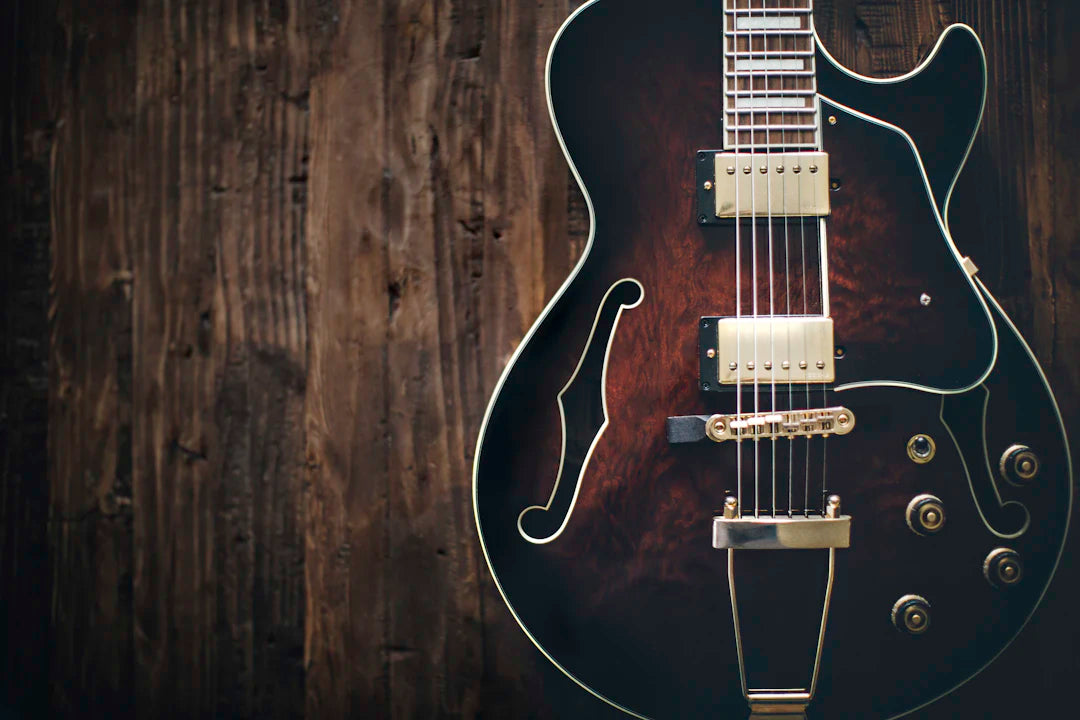Understanding how guitar pickups affect your tone is essential for any guitarist. Whether you play in a band, enjoy recording at home, or just love strumming for fun, the right pickups can dramatically shape your sound. In this blog, we will explore the role of guitar pickups, their different types, and how they specifically influence your tone. From the classic sound of single coils to the robust power of humbuckers, we’ll cover it all.
What are Guitar Pickups?
Guitar pickups are electromagnetic devices that capture the vibrations of the strings and convert them into an electrical signal. The sound you produce while playing is essentially an interpretation of how these pickups interact with the strings, your guitar body, and the amplification system that follows. The key takeaway here is that pickups greatly influence your overall tone.
The Basics of Pickup Functionality
To fully appreciate the impact of guitar pickups, it's essential to understand how they function. When a guitar string vibrates, it disturbs the magnetic field created by the pickup’s magnets. This disturbance generates an electric current that conveys the string's vibrations. The output level and tonal qualities depend on various factors, including the type of pickup, its windings, and materials involved.
Types of Guitar Pickups
Guitar pickups generally fall into two categories: single-coil and humbucker. Each type has its characteristics and tonal properties. Let’s dive deeper into both types to see how they each affect tone.
Single-Coil Pickups
Single-coil pickups are known for their bright, crisp sound with a pronounced high end. This type of pickup is widely used in genres like rock, blues, and country. Some of the key features of single-coil pickups are:
- Bright Tone: Single-coil pickups allow for a clear and articulate sound, emphasizing higher frequencies.
- Low Output: With a lower output than its counterpart, single-coils can produce a more expressive dynamic range.
- Noise Sensitivity: Single coils are more prone to interference and hum, particularly in live situations.
Many players opt for custom guitar pickups to tailor the tonal qualities to their unique preferences. The Odyssey Solstice Tele Bridge is an excellent example of a single-coil pickup that can add clarity and brightness to your tone, making it perfect for genres that require a sharp punch.
Humbucker Pickups
Humbucker pickups, on the other hand, consist of two coils wired together to cancel out unwanted noise and hum. They thus produce a thicker, warmer sound compared to single-coil pickups. Here are some key characteristics of humbuckers:
- Warm Tone: Hum buckers tend to provide a fuller, rounded sound, ideal for rock, jazz, and heavier genres.
- Higher Output: These pickups deliver a stronger signal, making them suitable for driving amplifiers into overdrive.
- Noise Resistance: The design of humbuckers naturally reduces noise, allowing for cleaner sounds even at higher volumes.
If warmth and depth are what you seek, you might consider using a humbucker equipped guitar to achieve a rich tonal palette.
The Influence of Pickup Placement
The position of guitar pickups significantly influences the tonal characteristics. Most electric guitars will have pickups positioned at the bridge, middle, and neck, each providing a unique sound profile.
Bridge Pickup
The bridge pickup is often responsible for the punch and brightness of the guitar tone. Because it captures the vibrations closer to the bridge, it emphasizes higher frequencies. This position is perfect for cutting through a mix, making it a favorite for solos and dynamic playing. For example, the Odyssey Solstice Tele Bridge is designed to offer brilliance and clarity, excelling in its role at the bridge position.
Middle Pickup
The middle pickup provides a blend of both brightness and warmth. When utilizing both the neck and bridge pickups, this position adds a unique hue, often resulting in a bell-like tone that is both versatile and rich. Players often use this setting for rhythm playing, as it balances frequencies well.
Neck Pickup
The neck pickup is famed for its lush, thick sound, emphasizing the lower frequencies. This pickup location is perfect for softer tones and warm, melodic passages and is also generally better for cleaner sounds. Guitarists often prefer the neck pickup for blues and jazz due to its smooth, melodic capabilities.
How to Choose the Right Pickups for Your Tone
When considering the perfect pickups for your guitar, several factors come into play. Here are key considerations to ensure you find the right fit for your playing style:
- Musical Genre: Choose pickups that complement the genre you most often perform. Bright and articulate pickups work well for fast, lead-based solos, while warm, full pickups enrich rhythm parts.
- Playing Style: If you're an expressive player who relies on dynamics, consider pickups, like custom guitar pickups, that allow for a wide range of output.
- Amplifier Compatibility: Always consider how your pickups will interact with your amplifier settings. Bright pickups can sound harsh through a distorted amplifier, while warmer pickups can achieve a creamy, smooth sound.
Wiring and Configuration Options
The wiring configuration of your pickups can also affect your tone. Many players experiment with different wiring setups to customize their sound further. Selecting between series, parallel, or split configurations can yield vastly different results:
- Series Wiring: This setup combines signals from both pickups, creating a fuller sound. It's common with humbuckers for added power.
- Parallel Wiring: Offers a clearer, more defined sound. It’s beneficial for maintaining the original character of single-coils.
- Coil Splitting: This technique allows a humbucker to function like a single-coil, enabling players to switch between tonal options while using the same pickup.
Tonal Experimentation
Experimentation is key when it comes to finding the tone that suits you best. Consider swapping pickups, trying different combinations, or even investing in custom guitar pickups designed to match your specific tonal attributes. The right setup can help you discover a sound that resonates with your musical identity.
Understanding the Importance of Magnet Types
The type of magnets used in pickups can also affect your tone significantly. The most common magnet types include Alnico and Ceramic, each possessing unique tonal characteristics:
- Alnico Magnets: Known for their sweet and dynamic response, Alnico magnets tend to offer a more vintage tone with a strong mid-range emphasis.
- Ceramic Magnets: These provide a higher output and are snappier, boosting the treble frequencies. They usually suit heavier genres that require a more aggressive sound.
Are More Expensive Pickups Worth It?
As a musician, it often becomes necessary to assess if higher-priced custom guitar pickups are intrinsically better. While pricier pickups may utilize better materials and sophisticated winding techniques, individual taste plays a significant role in picking the perfect sound. What might work for one player may not appeal to another. Thus, playability and personal preference should guide your decision rather than merely price.
Final Thoughts on Tone and Pickups
The journey into understanding how guitar pickups affect tone can radically transform your playing experience. With various types of pickups, configurations, and wiring techniques, the possibilities are endless. Experiment with different combinations to uncover the unique sounds that resonate with your style. You never know when you might stumble upon a new favorite tone. So, grab your guitar, dive in, and enjoy the sonic adventure that pickups can provide.











